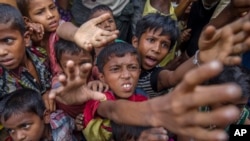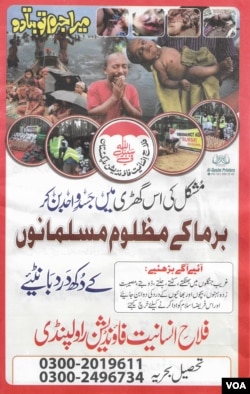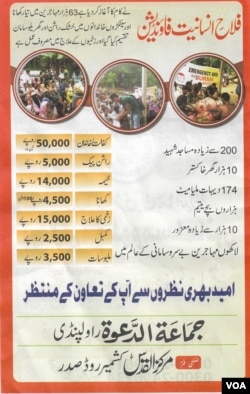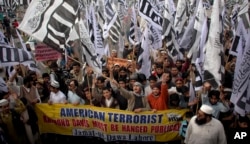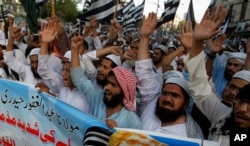A Pakistan-based group listed as a terrorist outfit by the United Nations and the United States has been openly collecting donations in the name of helping Rohingya Muslims.
People in Rawalpindi received leaflets inside some newspapers Monday requesting donations for the "oppressed Muslims of Burma," an older name for Myanmar.
The two-sided flyers in the local Urdu language contained an appeal from Jamaat ud Dawa and its charity arm, the Falah e Insaaniyat Foundation.
The piece of paper showed photos of men, women, and children in dire conditions and suggested aid amounts. One family could be helped for three months for approximately $500, according to the piece of paper that included phone numbers to contact. Similarly, an injured person could be treated for approximately $150.
A spokesman for the group, Abdul Rahman, said the group was running its charity drive for the Rohingya Muslims in "every district of Pakistan."
He also claimed that members of his group were helping the Rohingyas in multiple countries.
"Our brothers have reached Indonesia and have constructed temporary wood and fiber houses for them, arranged for their monthly groceries and set up a bread plant for them," he said.
Doubts about ads
In addition, Rahman said the FIF members were feeding 63,000 Rohingyas in refugee camps on the shores of River Naf, a river that marks the border between Bangladesh and western Myanmar.
While VOA has not been able to independently verify any of these statements, Ali Ahsan, a Bangladeshi journalist who has been to Cox's Bazar and has covered Rohingya issues, called these claims "fake news."
Ahsan called 63,000 "a huge number. If anyone was doing charity at that scale, I would have heard about it." The only Islamist charity involved in providing any significant aid in that area was the Islamic Movement of Bangladesh, he said.
Similarly, Nupa Alam, a correspondent of Bangladesh's Channel 24 television news and a native of Teknaf, in the Cox's Bazar district, said that he knew of no organization called Jamaat ud Dawa or Falah e Insaaniyat that was feeding Rohingyas in that area.
He said the 63,000 figure was "out of the question."
The eight feeding centers operating in the area, Alam said, were being run by the Bangladesh government and military.
Hasan Askari Rizvi, a political analyst in Lahore, said it was highly unlikely that the current Bangladesh government, with its tense relations with Pakistan and critical stance on Islamists, would tolerate the charitable arm of the Pakistani militant group openly operating in its territory.
There was also no way of knowing where the money was really going, Rizvi said, adding that it was possible that they were collecting donations in the name of Rohingyas but spending the money elsewhere.
Crackdown pledged
A spokesman for the Pakistan government, Musadik Malik, said the Ministry of Interior was aware of the charity drive and had already instructed police to take action against anyone collecting money in the name of these organizations.
The United States has long complained that despite billions of dollars in aid aimed at curbing the influence of banned terrorist groups in the country, some well-known groups such as JuD still operate with impunity. But government spokesman Malik said the administration was serious about cracking down on these groups.
"They had 66 accounts in the country. All of them have been ceased," he said. "We have canceled licenses of weapons of anyone associated with JuD and taken over their headquarters in Muridke, Punjab, to turn it into a Center for Peace and Development."
The United Nations has listed JuD as part of Lashkar-e-Taiba, a group that India and the U.S. blame for a devastating series of attacks on the Indian financial capital, Mumbai, in 2008. The coordinated attacks, which lasted several days and killed more than 160 people, brought India and Pakistan to the brink of war.
"LeT has financed terrorist activity and provided training, logistical and infrastructural support to further such activity through its front organization, Jamaat ud Dawa," according to the U.N.'s website.
Pakistan has placed the leader of JuD, Hafiz Muhammad Saeed, under protective custody since the beginning of the year. However, he has been placed under similar custody before, only to be freed by the country's courts that said there was insufficient evidence to hold him.
The U.S. has placed a $10 million bounty for information leading to his arrest and prosecution.
Pakistan has faced increasing pressure from the international community to take action against all militant groups, including LeT and JuD.
Last month, U.S. President Donald Trump blasted the country for "housing the very terrorists that we are fighting."
Earlier this month, Pakistan's longtime ally and protector China joined Brazil, Russia, India and South Africa in expressing concern about Pakistan-based groups.
"We, in this regard, express concern on the security situation in the region and violence caused by the Taliban, [Islamic State] ... , al-Qaida and its affiliates including Eastern Turkistan Islamic Movement, Islamic Movement of Uzbekistan, the Haqqani network, Lashkar-e-Taiba, Jaish-e-Mohammad, TTP and Hizb ut-Tahrir," the leaders of the BRICS nations, a group of the five emerging economies, said after a summit in Xiamen, China.
Network in Pakistan
Pakistani Foreign Minister Khwaja Asif recently said that the country needed to "put its own house in order."
That, according to Rizvi, is easier said than done.
"The problem is that these groups have support in the society. They have a huge network," which was why he said many of the mainstream political parties hesitated in openly criticizing these groups.
"There is a huge ambiguity in the government's policy towards them," said journalist Zahid Hussain, who has authored several books on the rise of militant Islam in Pakistan.
Pakistan's government has placed JuD under observation, but Hussain thought that was more "on paper" than in action.
The group has recently started efforts to formally enter Pakistan's politics through the launch of a new party called the Milli Muslim League. Pakistan's English-language daily, the Dawn, called it "the new political face of JuD."
The party's candidate, who ran as an independent in a recent by-election in Lahore, had the pictures of Hafiz Saeed on banners for his election campaign.
Rizvi pointed out that the government was going to find it hard to crackdown on JuD while relations between India and Pakistan remained tense.
"If you take this action while India was breathing down your neck, people will say the government caved in to India," he said.
Relations between the two South Asian rivals are currently extremely tense. At the recent U.N. General Assembly in New York, Pakistan's prime minister accused India of state-sponsored terrorism and of gross violations of human rights in the disputed Kashmir region.
India's foreign minister responded by calling Pakistan "the world's greatest exporter of havoc, death and inhumanity."




